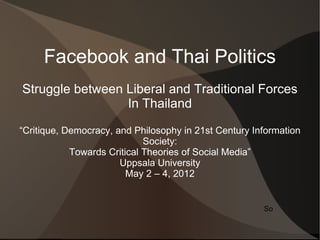
Facebook and thai politics
- 1. Facebook and Thai Politics Struggle between Liberal and Traditional Forces In Thailand “Critique, Democracy, and Philosophy in 21st Century Information Society: Towards Critical Theories of Social Media” Uppsala University May 2 – 4, 2012 So
- 2. Soraj Hongladarom Department of Philosophy Center for Ethics of Science and Technology Chulalongkorn University
- 3. Outline Background of the current political conflict in Thailand How Facebook has become a battleground Clash between values – the lese majeste law in Thailand Does FB itself embody certain values? And can they clash with the traditional values of a local culture? Implications for democracy in Thailand
- 4. Background In September 2006 a coup d’etat toppled the government of Prime Minister Thaksin Shinawatra Since then there has been ongoing political conflicts between those who support Thaksin and those who want him out. This can be seen as an expression of a struggle between progressive and conservative forces. The struggle can be viewed through various interlocking perspectives.
- 5. Interlocking Perspectives Personal Privy Councillor Chief Prem Tinsulanonda vs. Thaksin Cultural Traditional vs progressive forces Political “Thai style” democracy vs Electoral, representative democracy
- 6. Perspectives Value “Traditional” Thai value vs. More egalitarian and “globalized” value Social Urban middle class vs. Growing rural middle class Traditional royalists vs. Those who want to see modern form of monarchical system Economical “Sufficiency economy” vs. more globalized, advanced form of economy
- 7. Social Networking Sites Sites such as FB and Twitter are being used extensively on both sides. Usually those who regard themselves as belonging to one side or the other flock to the places that are friendly to them. There are not many debates between the two sides. This seems to substantiate Sunstein’s claim (2007) that internet tends to balkanize people.
- 8. However, SNS’s appear to open up much needed space in Thailand for possibility of real democratic deliberation.
- 9. The Lese-majeste Law Thailand has the most severe form of lese-majeste law in the world. The purpose is to protect the monarchy from criticism and to uphold a desired image of the monarchy to the public. However, SNS’s have done much to puncture this image, thus opening up much more space for discussion, as well as increased chances for persecution.
- 10. Lese-majeste The law shows that there are “forbidden areas” that cannot be touched. It is alleged that the people around the royal family hide in these areas thus making themselves immune from being held accountable. Moreover, the power of the LM law has been used as a political tool to silence political opponents.
- 11. Since the coup in 2006 the number of LM cases has jumped significantly (Streckfuss). However, SNS’s appear to open up much needed space in Thailand for possibility of real democratic deliberation. The opening up coincided with the passing of the Computer Crime Law which gave the authorities jail anyone who they think are a threat to ‘national security’.
- 12. Sunstein The situation in Thailand seems to belie Sunstein’s picture. Instead of people splintering into many small groups, what is happening is that SNS’s are uniting large number of people together. They interact and share informaiton together and engage in thought provoking discussion in such a way hardly imaginable before the SNS’s.
- 13. According to Sunstein, people tend to follow their own narrow interests, but what is happening in Thailand is that the SNS’s make it possible for people to form a powerful front against the entrenched traditional force. The outcome of this struggle remains to be seen, but the traditional elites appear to be in full retreat. So, in the case where there is a strong, sweeping political transformation, people tend to band together using these online tools instead of splintering into many small groups.
- 14. What Kind of Democracy? The struggle in Thailand can be seen as one between the traditional “Thai-style” democracy and the more liberal and open one. Even those who advocate the former are using FB extensively – a shift from reliance on the elites to more popular representation, but still emphasis on anti-corruption (but the real motivation is to preserve the image of the King). So it appears that FB tends to result in more open kind of democracy, but much remains to be seen.
